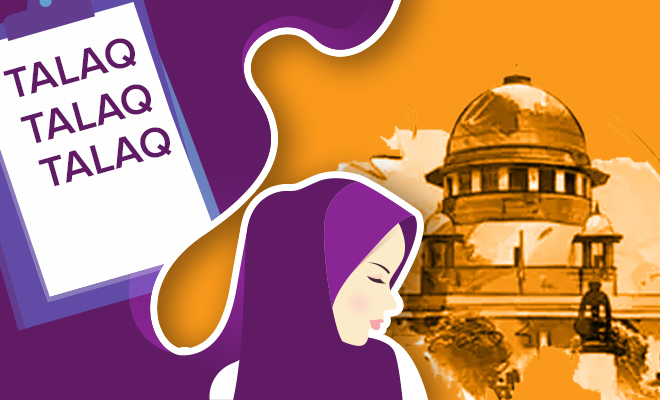A Kerala-Based Woman Lawyer Has Petitioned Against The Punishment For Triple Talaq. Why Are Women Working Against Women?

Sometimes when I sit down with my grandparents, or even my parents, to discuss marriage and the consensus is generally that this person is nice and loving and not imaginary. We also end up talking about the dynamics of a marriage in this country in general. How for them, marriage was mostly a trade where the woman would come in to the family only to serve to the whims and fancies of her husband, often at the cost of her own wishes and desires. But from then to now, a lot has changed. Marriage is no longer a transaction, it is a partnership, with an equal say from both the parties, not just in making things work but also ending them. And religion has nothing to do with it.
For the longest time, even with the world moving forward to give the women their due, Muslim women would still find themselves oppressed by the archaic Islamic laws, that have always placed power in hands of the man. In the case of marriage and divorce, for instance. But in 2019, after the triple talaq law was abolished, also known as the talaq-e-biddat, women everywhere cheered. With a three year punishment for the ones trying to practice it, we thought we were finally moving in the right direction.
That was up until recently where a Kerala lawyer called Noorbeena Rasheed moved to the Supreme Court to fight against the Protection of Rights on Marriage Act, which criminalises the practice of granting instant divorce. Her say was that, “The protection of women cannot be achieved by incarceration of husbands,” and honestly it made zero sense to us, coming from a woman herself.
Not that we want the men to feel trapped in a marriage that isn’t working for them, but let’s not forget the bigger matter at hand here where numerous men have exploited the right to simply mutter talaq three times and have left their wives stranded, just because they felt bored or annoyed, or simply to establish authority. For a long time, this was a sword held over a woman’s head. And if to save the interests of those women, from not just being stranded in the middle of the night, but also for their right to alimony money, we had to put in place acts that would abolish a practise like this.
An archaic and medieval practice has finally been confined to the dustbin of history!
Parliament abolishes Triple Talaq and corrects a historical wrong done to Muslim women. This is a victory of gender justice and will further equality in society.
India rejoices today!
— Narendra Modi (@narendramodi) July 30, 2019
Also Read : Mehbooba Mufti Isn’t Happy With The Passing Of The Triple Talaaq Bill. What’s Her Problem? We Think It’s Great!
Clearly, Noorbeena thought otherwise. Her petition also supported by organisations like Jamiat Ulama-i-Hind, All India Muslim Personal Law Board, Muslim Advocates Association, and two individuals, calls for the act to be disproportionate as well as excessive and stringent, seeking for it to be held unconstitutional.
IUML women leader P.K. Noorbeena Rasheed urges Rajya Sabha MPs to reject Triple Talaq Bill https://t.co/WTA7RoGKsd
— IndianMuslimObserver (@IMONewsOnline) February 3, 2018
https://twitter.com/BijaniLakshman/status/1280744736827957248
Arguing how this act could potentially tarnish marital relationships in case of false complainants, she said, ““This provision is highly detrimental not only to the wife but also to the marital relationship.” Her petition further said, “Welfare-oriented legislation would promote amicable resolution of matrimonial disputes rather than criminalise marital discord, particularly criminalisation of only one community…the intent behind the Act is not abolition of triple talaq [instant divorce] but punishment of Muslim husbands.”
This was said considering instant talaq has been banned in most countries including Pakistan and been termed as a cognisable offence, where the police can carry out arrests without any warrants. Hoping to overturn this ruling, she could single-handedly send Muslim women’s progress by decades, by once again giving priority to the interests of men.

















